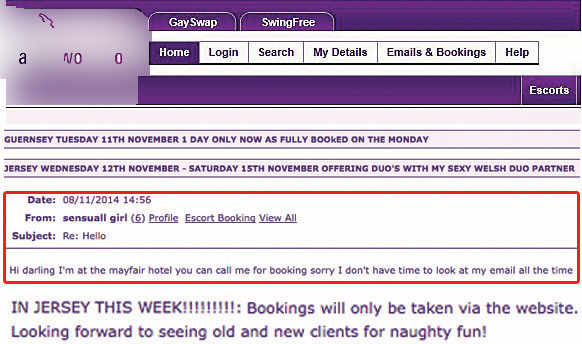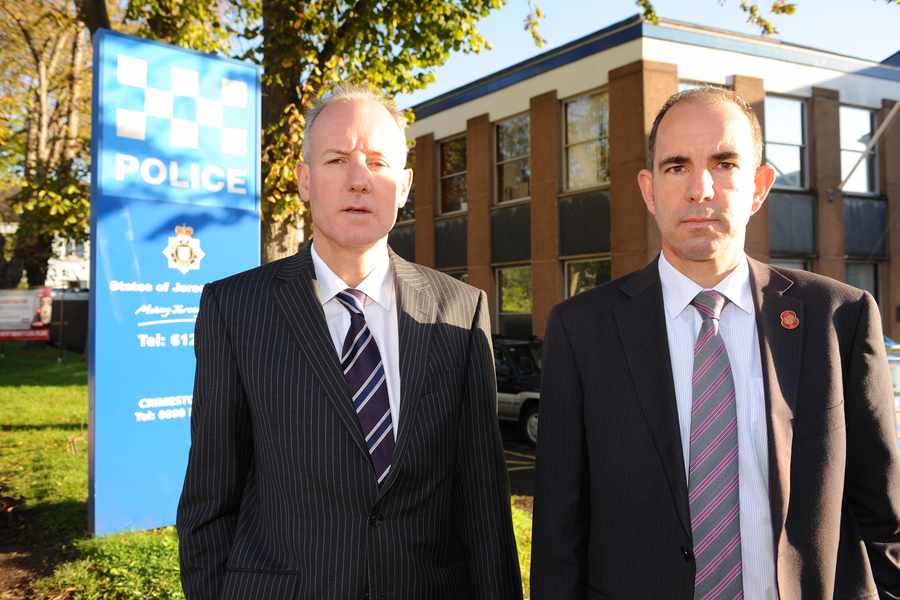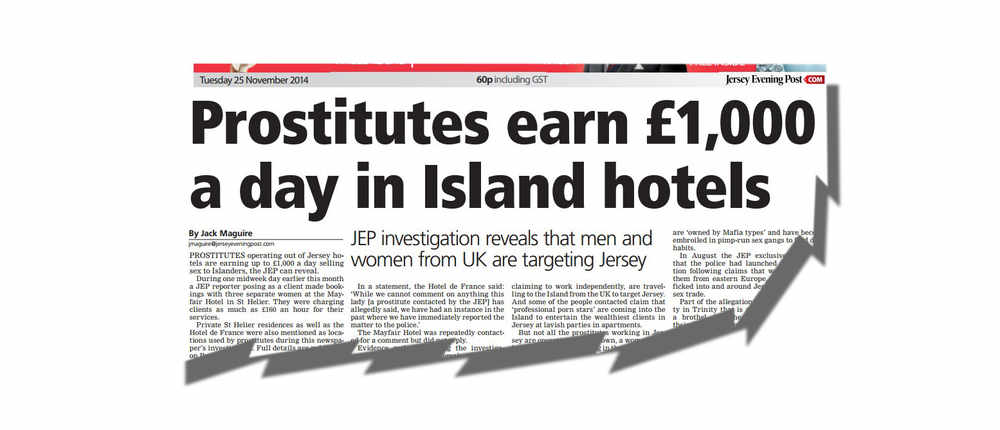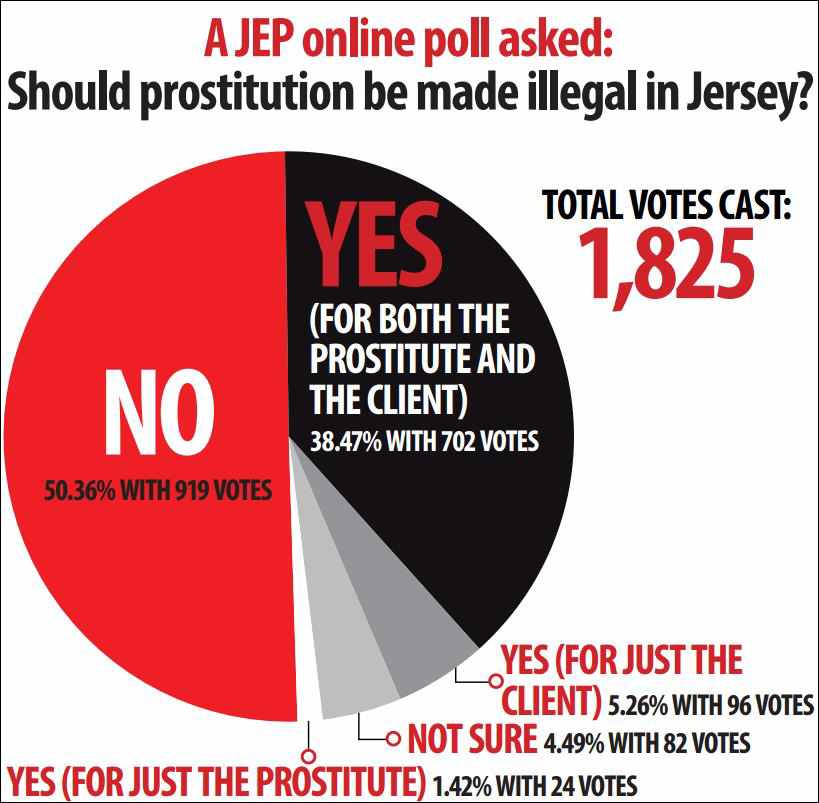last year.
At the height of the activity there were between 30 and 40 women advertising their services in the Island on the site which allows prostitutes to promote themselves around the world. That figure has now dropped to about ten.
On Thursday the States police revealed that they had launched an operation, codenamed Operation Phoenix, which involves officers from the Operational Support Unit briefing hotels in the Island on how to look out for vulnerable people who may be being exploited to work in the sex industry.

It follows an investigation carried out by the JEP last year which found that women, many of them travelling from the UK, were offering their services out of hotels in St Helier.
And now, speaking to the JEP, one escort, who has asked to remain anonymous but has worked in the Island in the past, said she believed many of the women being forced into the sex industry would not operate from hotels.
The escort, who says she works independently, said in her experience hotels were used by self-employed women. She said many of the women involved with gangs would work out of private apartments.
In December, Romanian national Catalin Mihail Avram, who had travelled to the Island from the UK, was deported and banned from the Island for three years by the Magistrate after he pleaded guilty to running a brothel in St Helier. The court heard how he had arrived in the Island with two women, one of whom was his pregnant girlfriend, whom he had sold for sex.
The escort, who spoke to the JEP last year and admitted she was aware of owned women being sold for sex in Jersey, said she felt it was important that police tried to stop women being forced into prostitution but added that it must not affect the independent trade which is legal.

‘I think they have to monitor girls.When I was working in Belfast the police would come and see if everything was okay.’
She added that some women she knew would willingly go to police and tell them what they were doing while others were ‘too scared’ and wished to remain anonymous.
‘A lot of people in the sex industry fear that by going to the police it will expose them,’ she added.

AS part of a three-month JEP investigation carried out last year, police revealed they were aware of as many as 40 prostitutes working or advertising sex for sale in Jersey.

Two senior officers, Detective Superintendent Stewart Gull and Detective Chief Inspector Chris Beechey said they had fears women may be being ‘forced, coerced or deceived’ into an undercover sex trade in the Island.
It followed reports in August that the States police had launched an investigation into prostitution in the Island.
A property in Trinity, as well as several other locations in the Island, were part of the investigation.
However, the officers in charged admitted they were effectively powerless to act in many circumstances due to the Island’s outdate prostitution law.
Following the reports in August, the JEP conducted an undercover investigation that found several women, many of them from the UK, were travelling to the Island and selling sex from well-known Jersey hotels for up to £160 an hour.
As many as four women were known to have been working out of the Mayfair hotel in St Helier on the same day in November.
Speaking to the JEP an escort, who used to work in the Island and asked to remain anonymous, said Jersey was now off-limits for her because the sex scene had grown too dangerous.


Following a JEP investigation which revealed that prostitutes were being trafficked into Jersey, Home Affairs Minister Kristina Moore says sexual exploitation in the Island is something that needs to be addressed.
Speaking in November last year, Deputy Moore praised the work of the States police’s public protection unit who she said were ‘shining a light’ into the dark corners of the Island’s sex trade.
But she added that it was a priority for her to ensure that Jersey’s prostitution law, which dates back to 1915, is updated.
The current law, which is written in French, does not make selling sex illegal but rather outlaws men from advertising or selling sex with women in the street or living off the profits from prostitution.
Work is already under way to rewrite the legislation, and it is thought that any new law would make the client the criminal rather than the sex worker.
Deputy Moore said: ‘It’s my understanding that the law is being updated and rewritten. I think modern thinking is now more aimed at the men purchasing rather than making the women criminals.’
Meanwhile, Deputy Moore said the States police had her ‘full confidence’ in combatting prostitution and sexual exploitation.
But she said: ‘It’s something we do need to look at. ‘Exploitation of women and young people is something that the States of Jersey police is addressing through its public protection unit.
‘There are dark corners in life in every country and the unit shines the light into those corners so that we can be aware of what is happening in Jersey.’

‘It should be regulated in some way, not just swept under the carpet.’
Lee Reeves
‘Why are they not taxed? Cash in hand, I suppose. Should have red-light district. They should register and have regular checks.’
Corrina Verlaine Amy
‘There’s prostitution in every country, every town, every city in the world, so why is Jersey any different and how is this a shock to anyone? I didn’t think it was legal though.’
Jaime Boylan
‘Time to be realistic. Prudishness and denial will only worsen the situation, so regulate and tax this service for consenting adults. Everyone else has to pay when it comes to goods and services. At least this would stamp out bully-boy pimps, ensure health concerns are addressed and put money in the States coffers.’
Cate Hamilton
‘Regulation and tax, with two consenting adults in a mutually agreeable arrangement. How wrong is it?’
Kieron Lambert
Mish Le Bean
‘News flash: it’s already here and won’t go away. So just legalise it and have it run properly.’
Steve Ozouf
‘Oldest profession in the world. Tax in to keep and control it. You are never going to stop it.’
Colin Jewison
‘It should stay legal too but if it’s more open as an industry it can be taxed and safer for everyone involved in the industry.’
Kate Le Texier
‘Jersey seriously needs to get a grip and update its laws. Prostitution is not illegal? Absolute madness.’
Kat Gallagher
THERE are still those who would rather the JEP hadn’t lifted the lid on Jersey’s hidden sex trade.
In November, the newspaper published the findings of an investigation into prostitution and echoed the concerns of the States police that women were being exploited by pimps and traffickers.
Since our investigation, the force has stepped up its efforts to tackle the problem and officers have worked hard to raise awareness in hotels to help staff identify those in the sex trade.
The value of this type of public interest reporting – which shines a light into areas of community life some would rather ignore – is clear. Looking the other way is no answer to issues of exploitation and abuse.







